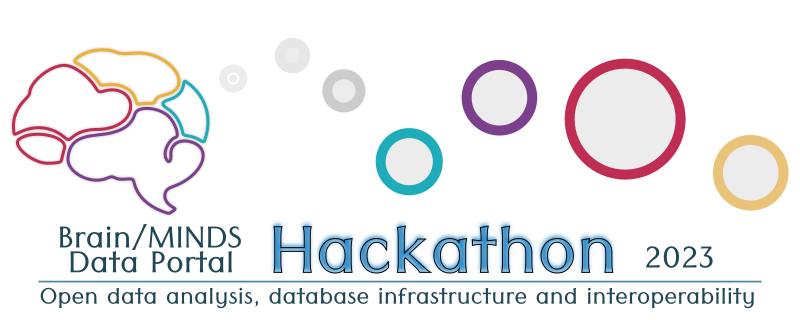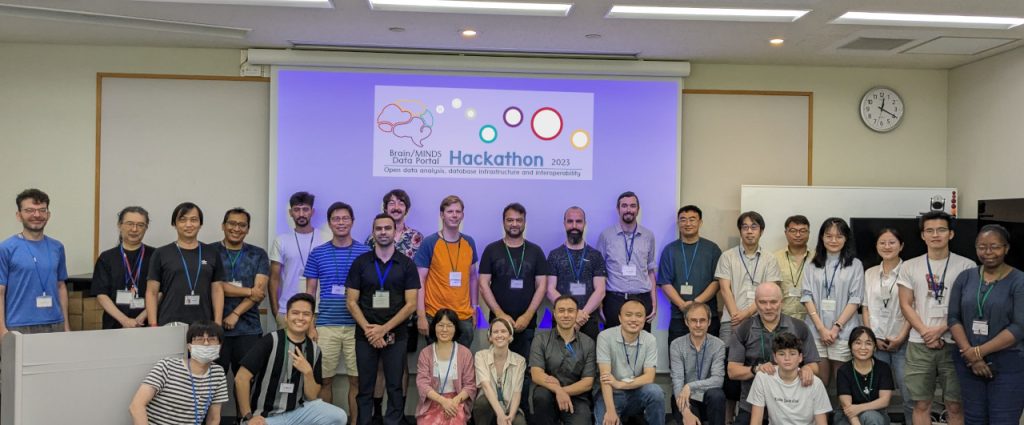
What is a Hackathon?
A hackathon is a type of event where participants work together intensively and creatively on software projects for a short duration, usually one or two days. The term hackathon combines the words hacking and marathon, implying a fast and focused process.
What is the Brain/MINDS Data Portal Hackathon?
The event is a collaborative meeting of Brain/MINDS and external experts with a focus on the development of software applied to the data on the Brain/MINDS Data Portal. The event covers the topics of computational data analysis, neuroinformatics tools for online databases (e.g. web viewers), database interoperability, and data discovery. Additionally, we have gathered some prominent international experts to give talks and share their expertise during the event. The event is open to academic and industry researchers, and students.
Benefits of the Event
The software results will be shared online and will help to promote and realize the potential of the large amounts of data being generated in Japan’s Brain/MINDS project, which contains rich information about brain structure, function, and connectivity. This will be a great opportunity to bring together both established researchers and up-and-coming students.
For experts it will be a chance to learn new data analysis and database techniques, establish research collaborations, and share their research and knowledge.
For students it will be a chance to interact with academic and industry experts, gain experience in applying their existing knowledge to the Brain/MINDS data, and learn new techniques on data analysis and database techniques. Student involvement is very important for fostering the next generation of researchers.
Venue
Open Call for Participation
Registration deadline: August 14, 2023. Registration closed.
Event Program
* BREAK as needed in a day
* BREAK as needed in a day
Hackathon Outputs

List of participants (alphabetical order):
Alexander Woodward, Alyssa Adams, Brent McPherson, Chong Zu, Cirong Liu, Cui Yuxin, David Soriano, Frederic Papazian, JB Poline, Julien Hubert, Ken Nakae, Luc Caspar, Luis Esteban Acevedo Bringas, Mao Jie, Mitchell Rogers, Patrice Delmas, Paule-Joanne Toussaint, Phi Doan, Rui Gong, Sartaj Ahmed Salman, Satoshi Oota, Shah Heidari, Shurun Wang, Takuto Okuno, Tanner Lund, Ying Tan, Zakir Ali, Zhe Sun.
 Go to the github repositories of the Hackathon to see the shared results.
Go to the github repositories of the Hackathon to see the shared results.
Contact
The Hackathon is organized and hosted by the Connectome Analysis Unit.
For more information, you can reach us here.
Terms & Code of Conduct
- Support for travel and accommodation expenses will be considered. Please consult us if you have the request. However please be advised that we may not be able to accommodate these expenses.
- Students need to get permission from their supervisors. Please include your supervisor’s name and contact information in the comment section when filling in the application form.
- The policy on research achievements for the Hackathon is as shown below:
- When an achievement involves alteration of an existing software platform, licensing is subject to the original software.
- When an achievement is newly developed by an individual, it is released and managed in an open source public repository, such as GitHub.
- In some circumstances, full disclosure may not be available due to research ethics.
- Copyright of an achievement belongs to the developer, but it will be treated as a result of Brain/MINDS activity.
- Lecture materials presented will be disclosed at this website, just like other developed achievements.
We expect cooperation from all participants to help ensure a safe environment for everybody.
- Be respectful and kind to others.
- Be Open
- Be Awesome & Have Fun
-
Do not insult or put down other participants. Behave professionally.
-
Participants from all backgrounds are welcomed.
-
Hack, meet new people, get creative, and enjoy the event.
Participants violating these rules may be asked to leave the Hackathon at the sole discretion of the Hackathon organizers. Thank you for helping make this a welcoming and friendly event for all.
NOTE: The Terms & Code of Conduct was adapted from past J-Node events and the UMass Chan Medical School Hackathon Code of Conduct page.
